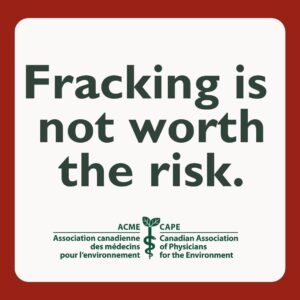Canadian Association of Physicians for the Environment, NB Lung, Canadian Association of Nurses for the Environment calling for permanent ban on fracking
Published Oct 17, 2024 • Brunswick News
There’s a crisis in British Columbia’s health-care system, and it serves as a grim warning for New Brunswick if the province’s decade-long moratorium on fracking is threatened.
Years into B.C.’s work on developing a massive liquefied natural gas (LNG) export industry – driven by fracking – we know from experience just how harmful this industry is to our health-care system.
But first, it’s worth noting exactly how fracking impacts our health. In a letter sent to New Brunswick’s premier last May, we and three other experts outlined the links between fracking and adverse health conditions including asthma, childhood leukemia, premature births, heart failure, and much more, including reference to medical research.
Some studies also suggest the extraction processes involved in fracking can worsen radon gas exposure, the second-leading cause of lung cancer in Canada. Radon is already a problem in New Brunswick, where one in four homes have high levels of naturally occurring radon.
Physicians working in northern B.C. near fracking wells are seeing the health effects and health costs of fracking on a daily basis. They report cases of patients suffering from rare lung diseases, tumours and cancers they link to fracking pollution. As a result, some feel they have no choice but to leave their communities to protect their own health and that of their families.
In the community of Dawson Creek, for instance, at least seven physicians specifically cited their fears about health and community impacts of the LNG and fracking industry as a major reason for why they left. This number represents nearly half of the 15 to 20 family physicians required to staff the city’s emergency department and provide primary care. The emergency department has closed multiple times this past year due to staffing shortages.
The costs to B.C.’s health-care system from fracking are significant. So too would the costs be to New Brunswick’s already stretched system if fracking were to go ahead. The province is home to a higher proportion of seniors than most provinces, including B.C.
Seniors already have higher health-care needs, and are also an age group that faces the most serious harms from fracking, including heart failure, as well as premature death from all causes.
 And then there’s the general strain that fossil-fuel-driven climate change places on provincial health care systems, from record heat waves and flooding to historic hurricanes. These are not just extreme weather events. Each one of them is also a public health crisis. Each disaster adds more demand for both immediate emergency health-care capacity and long-term follow-up care. The situation will only worsen if New Brunswick were to unleash fracking and help facilitate burning more LNG around the world.
And then there’s the general strain that fossil-fuel-driven climate change places on provincial health care systems, from record heat waves and flooding to historic hurricanes. These are not just extreme weather events. Each one of them is also a public health crisis. Each disaster adds more demand for both immediate emergency health-care capacity and long-term follow-up care. The situation will only worsen if New Brunswick were to unleash fracking and help facilitate burning more LNG around the world.
New Brunswickers know their health-care system is under stress, with more than half fearing they will not be able to access care when they need it. Unleashing fracking will only put more pressure on the system until it can’t keep up, and doctors and nurses feel they have no choice but to leave.
Hard lessons have now been learned in British Columbia that were entirely preventable. New Brunswick had the right idea a decade ago when it introduced a moratorium on fracking in the province based on the evidence that fracking poses unacceptable risk to human health and the health of the environment. The evidence has grown even stronger since then. If only B.C. had been wise enough to follow New Brunswick’s lead.
But experience has shown us that environmental wins can be reversed – or quietly dismantled. In 2019, the Progressive Conservative government passed regulatory changes to allow fracking to resume in the Sussex area. It caught many by surprise.
This past spring, the Canadian Association of Physicians for the Environment, NB Lung, and the Canadian Association of Nurses for the Environment called upon the provincial government to legislate a permanent ban on fracking to protect the health of New Brunswickers and prevent further strain on the health care system. We’re still waiting.
Dr. Melissa Lem is a family physician based in Vancouver and president of the Canadian Association of Physicians for the Environment.
Melanie Langille is an environmental scientist and the president and CEO of NB Lung.
